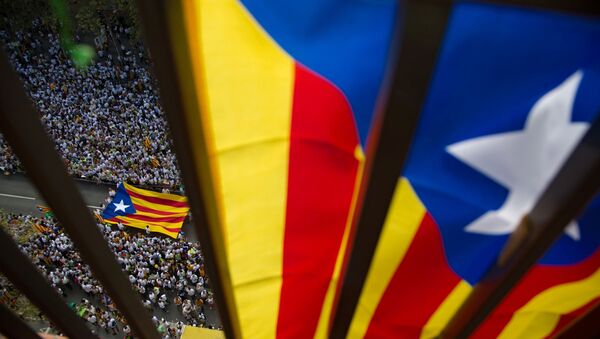Sputnik: What do you think is the next steps for Catalonia?
Professor Alfred De Zayas: We will have to see what Madrid does and how it does it. They certainly made an effort to negotiate and it failed, and I regret it. In my own proposals, I thought that a fresh referendum would be necessary to find out exactly what the Catalonian people wish. But this has not been possible now they have declared independence and of course a unilateral declaration of independence is not self-executing, it is not automatic.
It is however consistent with current international law and the international court of justice found in 2010 that the unilateral declaration of independence of Kosovo did not break international law. Of course we have the precedence of Slovenia, Croatia and Bosnia Herzegovina declaring themselves unilaterally independent. Now, one thing is declaring independence and another thing is getting the recognition from other states.
We have seen that the European Union has more or less stuck its head in the sand and played the ostrich and decided to say "no, that is exclusively a matter for Spain, an internal matter." Curious, if you contrast that with the way that the European Union has been meddling in the internal affairs in Poland and in Slovakia and in Hungary. So we have here more or less a rather arbitrary if not a la carte approach to international law.
Self-determination in the 21 century is no longer decolonization. Self-determination is democracy and democracy expresses itself by referenda, so prohibiting a referendum is an anomaly. An anomaly under Spanish constitutional law as Article 10, paragraph 2 of the Spanish constitution and Article 96 place international treaties and international human right laws above Spanish law, so Spanish law must be interpreted in the light of international law, and Article 1 of the international covenant on civil and political rights provides for self-determination, and it is not without reason that its Article 1. It has been given that important place in the list of articles. But we are facing a situation of fetishism of legality.
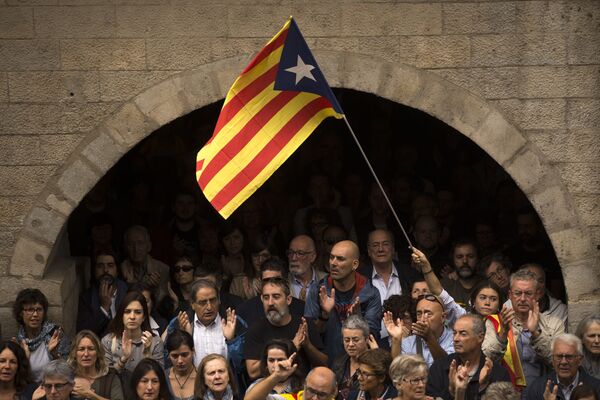
The government says that the referendum is illegal as will be the declaration of independence as illegal instead of sitting down and discussing those elements that would make it legal or illegal. Now this has been a debate in literature and law since Damone Memorial and now you already have it in Sophocles and pigonie and the romans said "dura lex, sed lex" — "the law is [harsh] but [it is] the law."
And you have to apply it even if it's hard and then you have Cicero coming against that view and saying "summum ius, summa iniuria" meaning "an excess of law, is the highest level of injustice," so instead of interpreting the law in the light of the spirit of the law, in the light of human dignity, what you are trying to achieve with law you simply block and say "nope, we will not tolerate a referendum and I consider that a mistake."
I would like to say the Catalan situation it is not a vanity type of secession, it is not vanity type self-determination, they do have their culture, they do have their history, they do have their identity, and Catalan autonomy has been encroached upon more and more in the last 15 years. That is also the opinion of professor colleagues of mine who have seen this move towards homologation in Spain and in the field of education.
But of course I have no clue what the Spanish or other the Catalans really want. If we had, had a referendum properly organized and conducted by the United Nations or monitored by the European Union and by the Carter Centre, then we would know what we want and then we could sit down like civilized people and discuss the options.
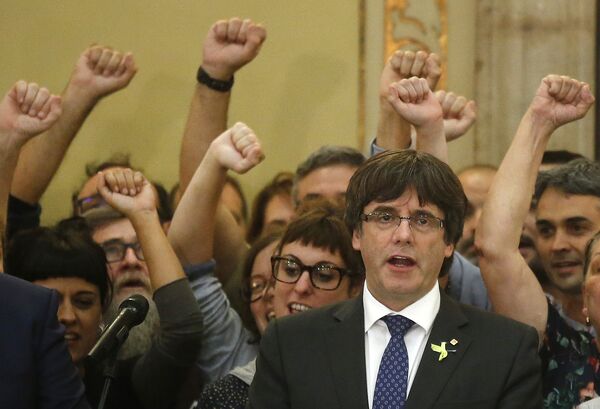
What I find absolutely outrageous in Europe in the 21st century, is that independence, would lead us to be arrested, so I mean this is having political prisoners. Can you imagine if the United Kingdom had decided to arrest the leaders of independence in Scotland or if Canada had decided to arrest the leaders of independence of Quebec instead of saying "let them hold a referendum, and if they have substantial two-thirds majority, then let's talk."
It is most regrettable in a European country that this has transpired.
Sputnik: What do you make of the Spanish senate approving direct rule over Catalonia?
Professor Alfred De Zayas: Well, I expected that. I mean it's quite clear that the Spanish Government had the majority to put that through.
But again, you still have Article 1 of the covenants on civil and political rights, and you still have the rule in international law of non-retrogression in human rights protection. So once you have given a state or a Provence or a territory a degree of autonomy, you're not supposed to encroach on it. You can approve upon it but you're not supposed to turn the clock back and that is the situation we have.
We will see what other actions are taken, and I would hope that the high commissioner of human rights of the European Union would pronounce itself on this amazing development. But thus far they have essentially kept quiet.
The European Union has shown a, shall we say, complicity with what is happening and it is regrettable because as I said, the European Union is applying double standards. You've seen quite clearly the efforts of the EU, vis-a-vis Hungary and they could immediate it.
I think the logical thing for the EU in a European State, is to offer its mediation, and after all, the Catalans are European citizens. You have seven and half million Catalans and they have been very peaceful in their demands. As a matter of fact, they have been demonstrating for independence for a good 10, 15 years and the independence movement is of course a lot older, but it has come of age in the recent past. It has come of age not as a terrorist movement, not as a violent movement but is has come of age in a very orderly and peaceful way.
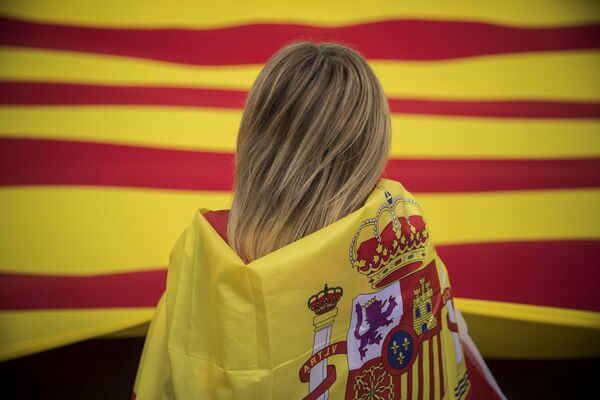
It is my worry, that if you remember back in 1989, Slobodan Milosevic canceled the autonomy of Kosovo. The direct result of doing away with Kosovo's traditional autonomy was that you had the Kosovan Liberation Army established and then you had a war that ended in 1999 with the bombardment of Serbia and Kosovo, with tens and thousands of deaths. Now I don't think we want to see that repeated and I think that canceling the autonomy of a people that is accustomed to autonomy is a mistake.
I think all of this could have been avoided if there had been a negotiation. If there had been an internationalization of the product. If you had, had the European of court of justice in Luxembourg pronouncing itself on the status of autonomy of the Catalans and in the efforts of encroaching or reducing or canceling that autonomous status.
But again, there has been a lack of leadership, and I hope that in the following weeks we will not see more violence. I think a realization of the right of self-determination is a conflict preventative measure. It is a strategy that the Europeans should have had and let's remember, that the Europeans recognized the unilateral declaration of independence of Slovenia barely ten days after Slovenia had declared itself independent and that in itself was recognizing the breakdown of the territorial integrity of the federal state of Yugoslavia. The same thing happened with the unilateral declaration of independence of Croatia and the declaration of independence of Bosnia Herzegovina. So the Europeans felt fine, they go along with all of these unilateral declarations back in the 1990's, but now they don't want to do it.
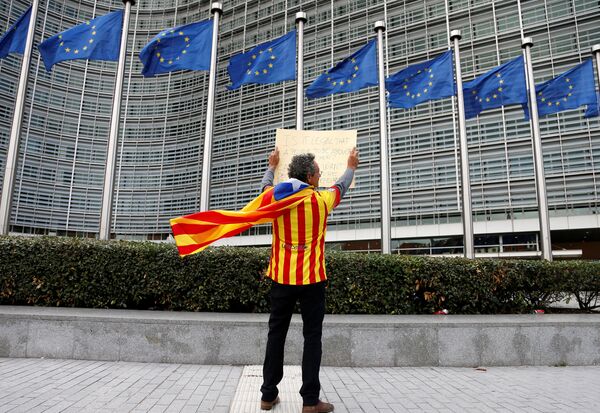
So you would think that once the genie is out of the bottle that you can't' really put it back into the bottle. But they are acting like all of this hadn't happened and they didn't create any precedent. And therefore we are dealing with the Catalan situation as having no precedent in international law that you can apply to it, and that is wrong.
Of course, that's politics and politics is very frequently more powerful than international law and international law is also violated with impunity.
